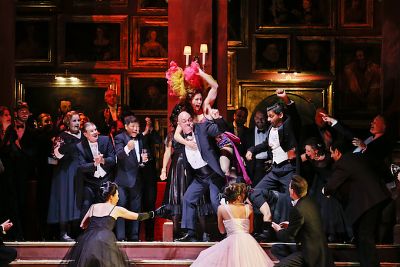
Opera Australia | Rigoletto
Click here if you liked this article 15 ![]()
Date Reviewed: 11/05/2019
Giuseppe Verdi’s tireless opera, Rigoletto, opened Saturday 11th May at the State Theatre in Melbourne. Opera Australia hit the jackpot by bringing together a stellar cast of artists at the top of their game.
This opera has quite a history. It premièred in Venice, 1851 after several revisions were made to appease censors who considered it scandalous. The opera, originally called La Maledizione (The Curse), is based on Victor Hugo's controversial five-act play Le roi s'amuse, which was banned by the French government after one performance. I was surprised to learn that Verdi wrote most of the score within a mere 40 days, when he was 38 years old (considered mature age at the time). He was revising the score right up until the rehearsals and swore the actors to secrecy for fear of plagiarism. He only revealed the tune of "La donna è mobile", to the “Duke” a few days before the première. Verdi entrusted the libretto to the poet Francesco Maria Piave, who matched Verdi’s score with dramatic fervour.
Rigoletto is a quick-witted court jester to the Duke of Mantua. The Duke uses his wealth and power to exploit any woman that catches his eye, perpetually seeking conquests of carnal desire. Rigoletto helps him by humiliating the courtiers whose women have been demoralised by the Duke. The fun ends when Rigoletto takes his mockery too far and is cursed by one woman’s father, Count Monterone. Rigoletto is haunted by this curse because he has a daughter of his own, the only person in the world whom he loves. He is fearful that she will fall prey to The Duke. No matter how hard he tries to protect her, his daughter, Gilda, who is only allowed out of the house to go to church, meets The Duke. She is seduced and falls in love with him and ultimately loses her life when Rigoletto’s revenge plan fails.
Before the curtains are drawn, we hear Orchestra Victoria under the expert baton of Andrea Licata. This short orchestral prelude masterfully sums up Count Monterone’s fatalistic curse and Rigoletto’s nightmare, which leads to its devastating end.
At curtain rise, there is a stark contrast as we enter the opulent party scene at The Duke’s palace. Anthony Hunt leads Opera Australian Chorus to Verdi’s playful and seductive music, painting a picture of raunchy fun. During the frivolities, The Duke, tenor, Liparit Avetisyan, sings the teasing tune "Questa o quella" and unveils his predatory character.
Avetisyan’s voice radiates power as much as does his manner as The Duke. Even though he is ruthless, it is easy to be charmed by him when he sings some of the most stunning music ever written. One piece that comes to mind is ‘E il sol dell'anima’, when he declares his love for Gilda.
Mongolian baritone, Amartuvshin Enkhbat is a vocal marvel. Unlike anyone else today, he has the voice and passion for Rigoletto. When he sings "Cortigiani, vil razza dannata" his vulnerability and torment is experienced by each in the audience.
Stacey Alleaume, the budding Australian soprano makes her role debut as Gilda. It is easy to warm up to Alleaume. She has a lovely soprano voice and it’s true power is apparent when she sings the sublime 'Caro nome che il mio cor'.
Italian bass, Roberto Scandiuzzi is a superb Sparafucile with a booming voice. It all seems so effortless for him. His sister, Maddalena, played by Sian Sharp is a sensual seductress. Her stage presence is alluring as she baits the Duke into her love den.
Each time I watch this opera, the tragic tale of Rigoletto disturbs me. Although the plot is easily accessible, it is psychologically complex.
The story of Rigoletto reflects life’s cruel contradictions: a deformed, hideous character that is filled with love inside; a corrupt Duke who walks through life unscathed; an innocent girl who sacrifices her life, empowered by something she calls love. And all this drama played out to Verdi’s operatic masterpiece. Elijah Moshinsky’s, production of Rigoletto is certainly an event not to be missed.
Rigoletto plays at State Theatre, Arts Centre Melbourne until 29 May 2019.